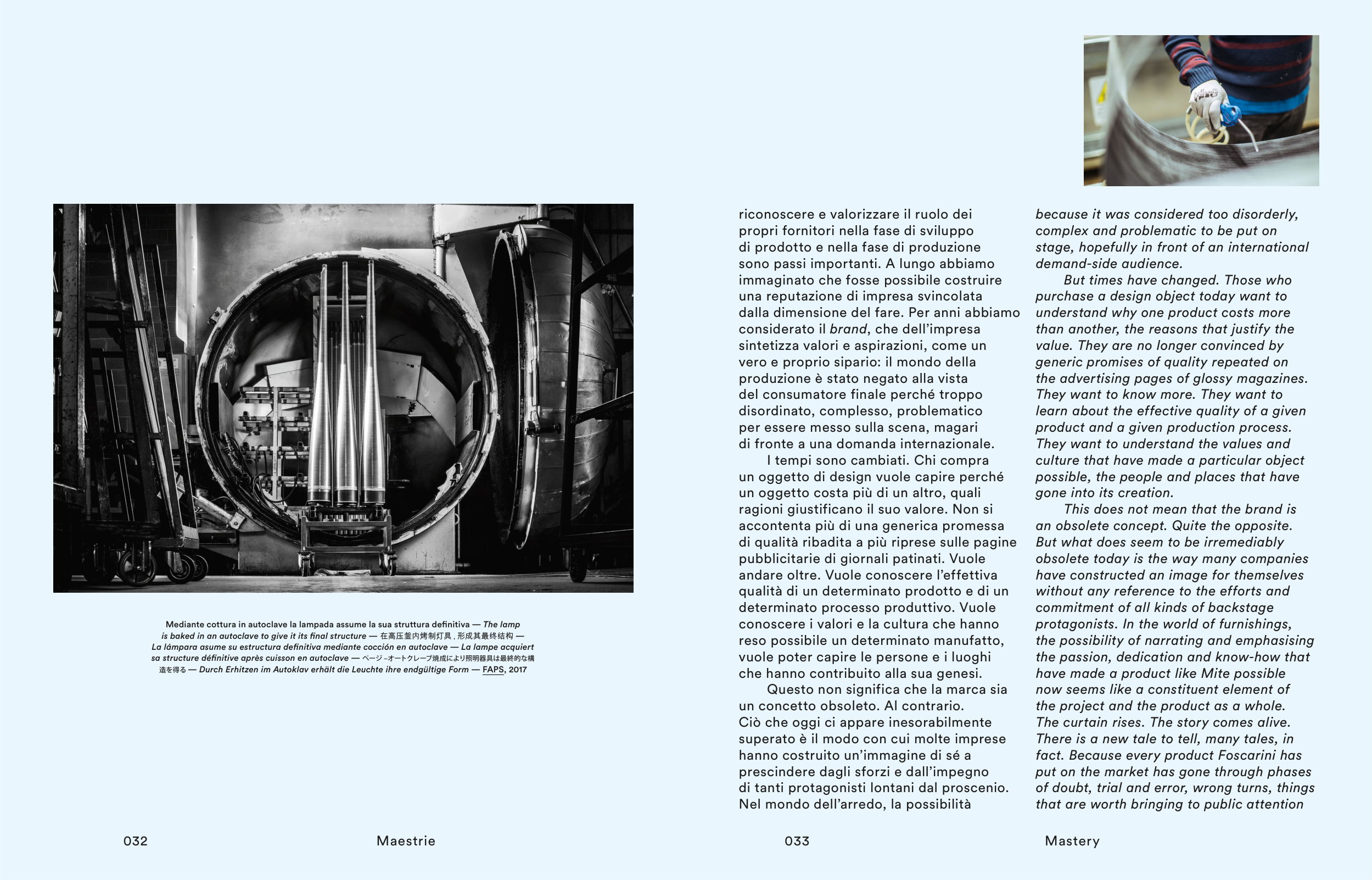riconoscere e valorizzare il ruolo dei
propri fornitori nella fase di sviluppo
di prodotto e nella fase di produzione
sono passi importanti. A lungo abbiamo
immaginato che fosse possibile costruire
una reputazione di impresa svincolata
dalla dimensione del fare. Per anni abbiamo
considerato il brand, che dell’impresa
sintetizza valori e aspirazioni, come un
vero e proprio sipario: il mondo della
produzione è stato negato alla vista
del consumatore finale perché troppo
disordinato, complesso, problematico
per essere messo sulla scena, magari
di fronte a una domanda internazionale.
I tempi sono cambiati. Chi compra
un oggetto di design vuole capire perché
un oggetto costa più di un altro, quali
ragioni giustificano il suo valore. Non si
accontenta più di una generica promessa
di qualità ribadita a più riprese sulle pagine
pubblicitarie di giornali patinati. Vuole
andare oltre. Vuole conoscere l’effettiva
qualità di un determinato prodotto e di un
determinato processo produttivo. Vuole
conoscere i valori e la cultura che hanno
reso possibile un determinato manufatto,
vuole poter capire le persone e i luoghi
che hanno contribuito alla sua genesi.
Questo non significa che la marca sia
un concetto obsoleto. Al contrario.
Ciò che oggi ci appare inesorabilmente
superato è il modo con cui molte imprese
hanno costruito un’immagine di sé a
prescindere dagli sforzi e dall’impegno
di tanti protagonisti lontani dal proscenio.
Nel mondo dell’arredo, la possibilità
because it was considered too disorderly,
complex and problematic to be put on
stage, hopefully in front of an international
demand-side audience.
But times have changed. Those who
purchase a design object today want to
understand why one product costs more
than another, the reasons that justify the
value. They are no longer convinced by
generic promises of quality repeated on
the advertising pages of glossy magazines.
They want to know more. They want to
learn about the effective quality of a given
product and a given production process.
They want to understand the values and
culture that have made a particular object
possible, the people and places that have
gone into its creation.
This does not mean that the brand is
an obsolete concept. Quite the opposite.
But what does seem to be irremediably
obsolete today is the way many companies
have constructed an image for themselves
without any reference to the efforts and
commitment of all kinds of backstage
protagonists. In the world of furnishings,
the possibility of narrating and emphasising
the passion, dedication and know-how that
have made a product like Mite possible
now seems like a constituent element of
the project and the product as a whole.
The curtain rises. The story comes alive.
There is a new tale to tell, many tales, in
fact. Because every product Foscarini has
put on the market has gone through phases
of doubt, trial and error, wrong turns, things
that are worth bringing to public attention
033
Mastery
032
Maestrie
Mediante cottura in autoclave la lampada assume la sua struttura defi nitiva — The lamp
is baked in an autoclave to give it its fi nal structure — ����������������� —
La lámpara asume su estructura defi nitiva mediante cocción en autoclave — La lampe acquiert
sa structure défi nitive après cuisson en autoclave — ページ ‒オートクレーブ焼成により照明器具は最終的な構
造を得る — Durch Erhitzen im Autoklav erhält die Leuchte ihre endgültige Form — FAPS, 2017


